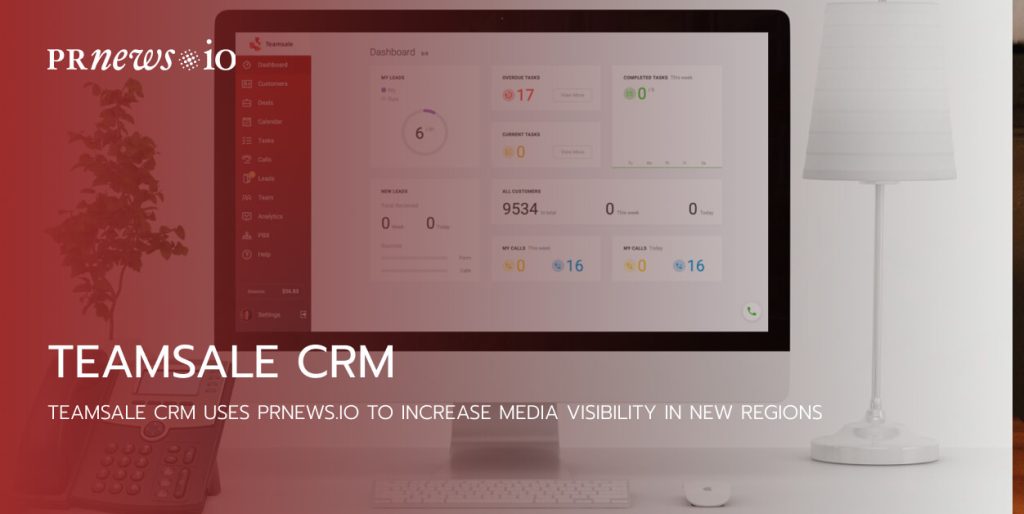Attention! Qualitative keyword analysis leads to the success of further actions in your SEO activities. If you don’t carry out a thorough review beforehand, once, you may find that the high search position of the website for certain keywords does not yield any tangible results. So… how to search for keywords?
Get extra income from your blog!
What are keywords?
Keywords are the words and phrases that people type into search engines to find specific information, services, or products. Keywords can also be called “key phrases”.
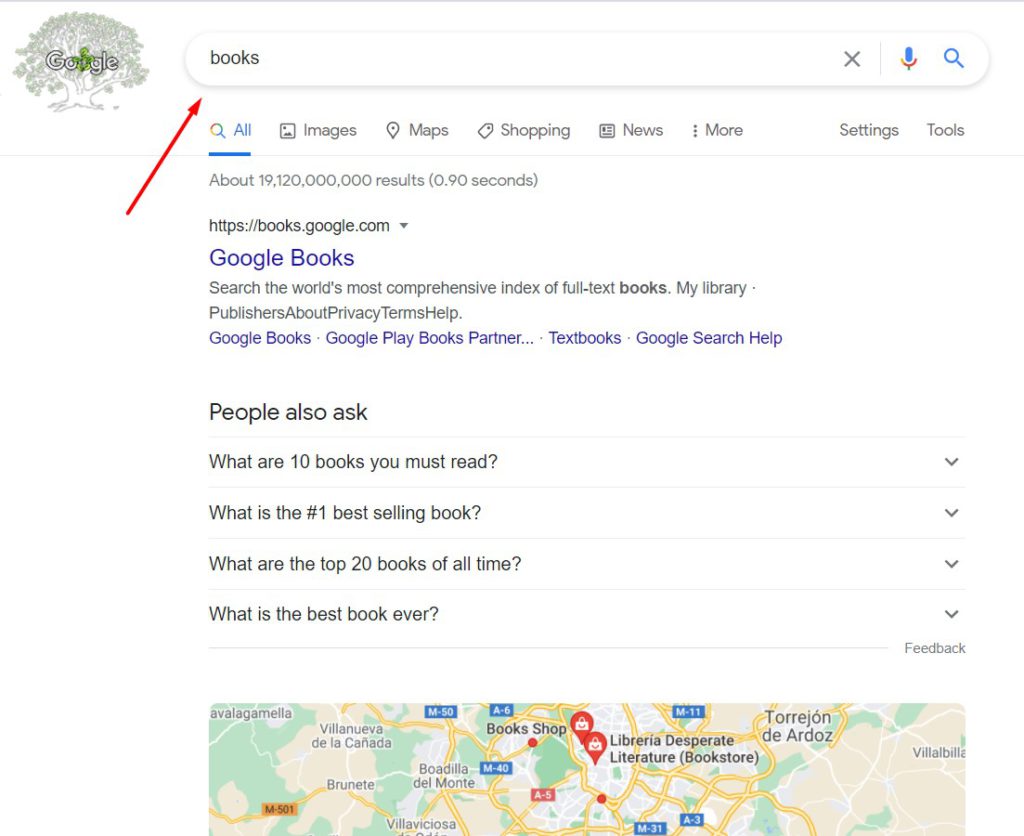
Considering keywords in the context of positioning, there are several types of keywords:
Branded (brand, company name) keywords
Branded keywords are the keywords that search engine users type more often when they do not know the specific address of the company’s website, but want to find it. Generally, websites do not require any special actions to be in the first position in the search results for the phrase that is the name of the company. The reason for this is that:
- the company name is usually unique (if you are still in the process of choosing a company name – check if there is another company with the same name, otherwise your website may not be in the first place in the search results for the phrase that includes the name of the company);
- the domain name usually is an exact match to the company name. And this also helps the website with the company name appear in high search results.
General keywords
General keywords are keyword phrases consisting mainly of 1-2 words. This type of keyword is most often used by users who are interested in certain products and services but do not yet have specific preferences. High rankings in search results for these keywords do not necessarily provide benefits to the company. In addition, positioning on such keywords is significantly complicated due to the high level of competition. Examples of the following keywords:
- universities;
- dresses;
- watches;
Long-tail keywords
Keywords of this type include, first of all, keyword phrases with two or more keywords. Internet users who type such words into the search engines have more specific needs and know exactly what they are looking for. Positioning on keywords of this type is easier because the competition here is less:
- MBA universities in Berlin
- White wedding dress
- men’s watch with a strap
This comparison mainly concerns the websites related to a particular business – the sale or promotion of services or products. In addition to the above types of keywords, you can also select informational keywords related to the search for specific answers, such as “the capital of Portugal”, “how to boil eggs” or “the president of the Czech Republic”.
To sum up:
- the fewer words a phrase typed in a search engine contains, the more often it is used by Internet users. At the same time, as the number of words in a phrase decreases, competition increases as well (respectively, as does the complexity and cost of positioning for that keyword).
- the more words a phrase typed in a search engine contains, the less competition there will be, as well as the lower the frequency of searching for that phrase among users.
It is also worth adding that more number of words typed into the search engine is an indicator of more specific needs. Respectively, there is a greater chance that moving from the search results page to your website, the user will find the necessary information on your website.
How to search for keywords?
You already know about the keyword types and their main characteristics. But how to find them? There are several ways:
List the products and services you offer
This is the main and most effective way to create a keyword list for positioning. At the same time, it is important to remember the area of your business. In the case of a company in our example that offers its services only within one specific location, it is worth adding the name of the city to the keywords, because this is how most Internet users will look for this service.
Here are some examples of the keywords, that you can choose depending on your business:
Example 1: computer service in California:
- repair of laptops California
- PC repair California
- cleaning laptops California
Example 2: online store of accessories for Apple products:
- iphone 6s case
- iphone 10 battery
- iphone 4 charger
Use the suggestions of the Google search engine
As you type in a selected phrase, Google usually offers some hints, so users can try to find the information they’re interested in for other appropriate phrases. These tips can be found in two places:

below the list of search results:
in the field where we type keywords:
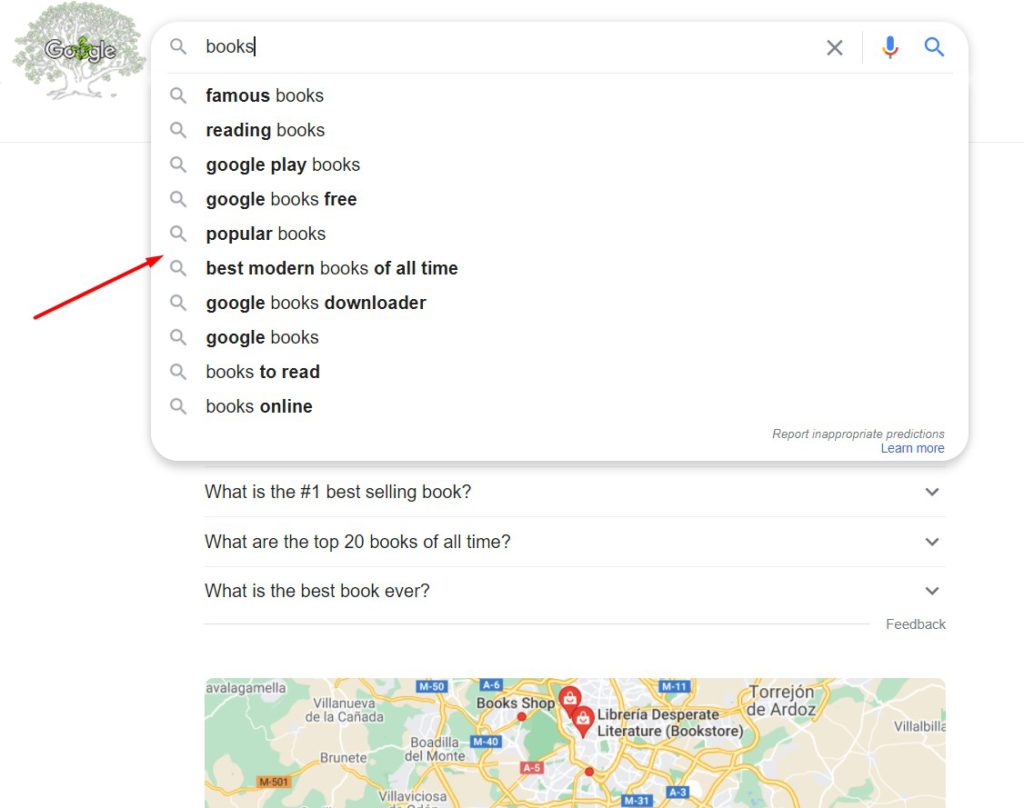
These suggestions are a good guide not only for those who are looking for information but also for those who want to choose keywords for the website positioning. Hints include phrases similar to the ones you typed, which are often used by Internet users.
3. Use the Ubersuggest tool
Ubersuggest is a tool that works similarly to Google search engine suggestions. Based on one keyword, you will get suggestions of others – similar keywords that are worth positioning, because Internet users are also looking for them.
It is very easy to use this tool:
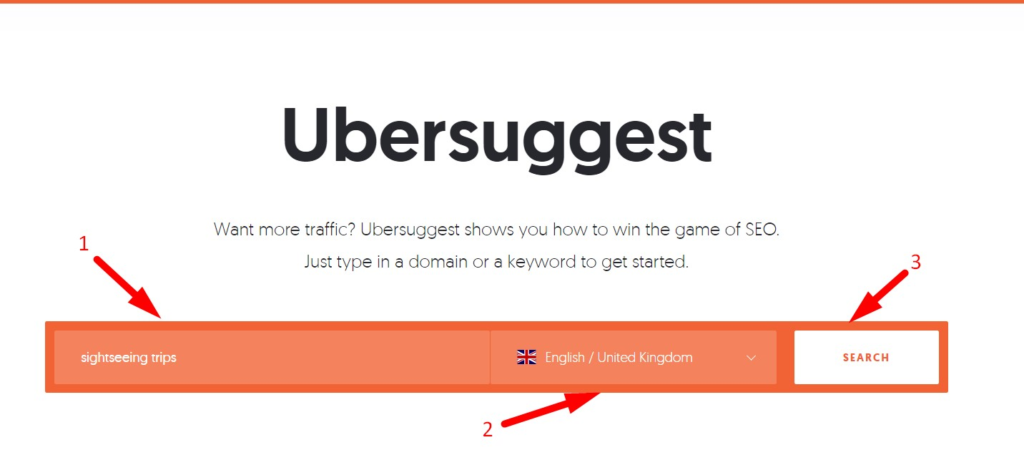
In the field (1) type the main keyword, in the field (2) select English/United Kingdom because we are interested in English keywords, popular in Great Britain, and click Search. Here are examples of results obtained for the keyword “sightseeing trips”:

A similar list of keywords can be obtained by typing in turn to the search bar
- sightseeing trips A;
- sightseeing trips B;
- sightseeing trips C.
And then you have to add the options offered by the search engine. With Ubersuggest this process will be performed automatically.
4. Use the KeywordTool tool
A similar tool is KeywordTool. The principle of its operation is very similar, but the number of proposals with ready-made keywords is even bigger. The KeywordTool interface is quite intuitive and easy to use:

In the field (1) you must type the basic keyword, based on which you want to generate suggestions for other keywords, then click on the button (2).
Here are the results in this case:
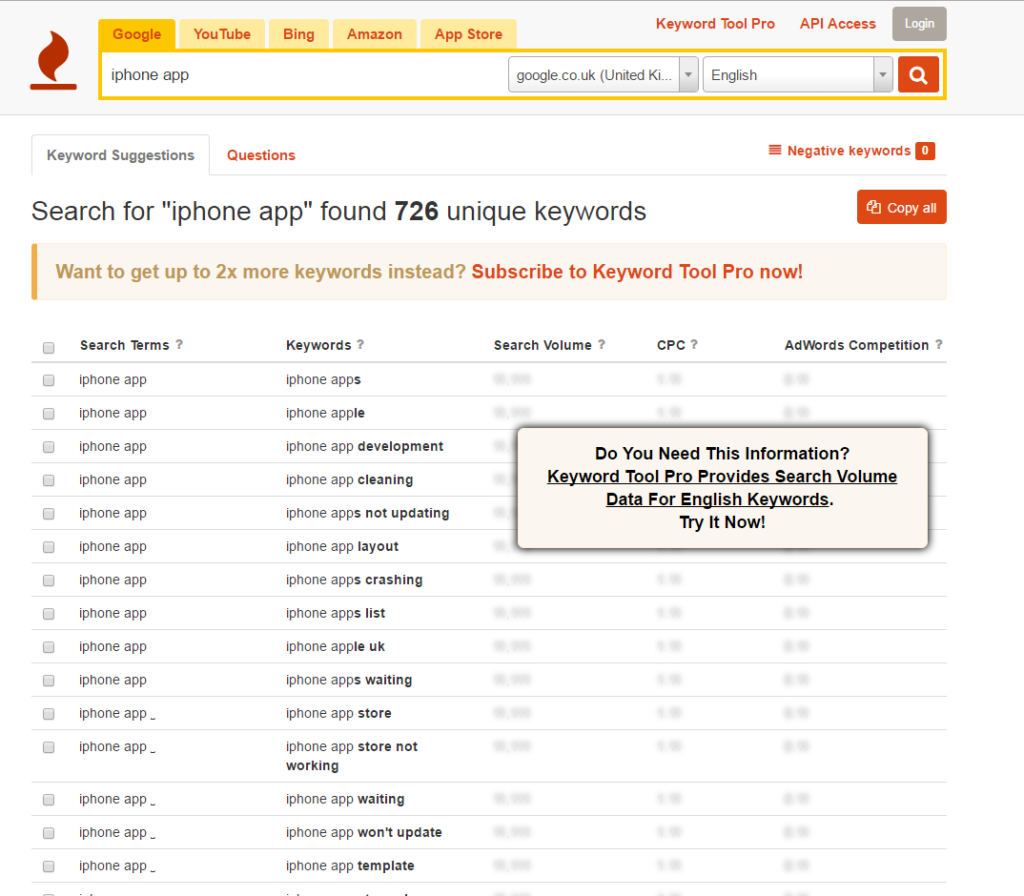
5. Use the Google AdWords Keywords Planner tool
Another tool to help you choose the right keywords for positioning is Google AdWords KeywordTool. To use, you need to sign in to your Google Account and follow this link in your browser. You can get a list of keyword suggestions by selecting the “Find keyword and ad group (Discover new keywords)” option.
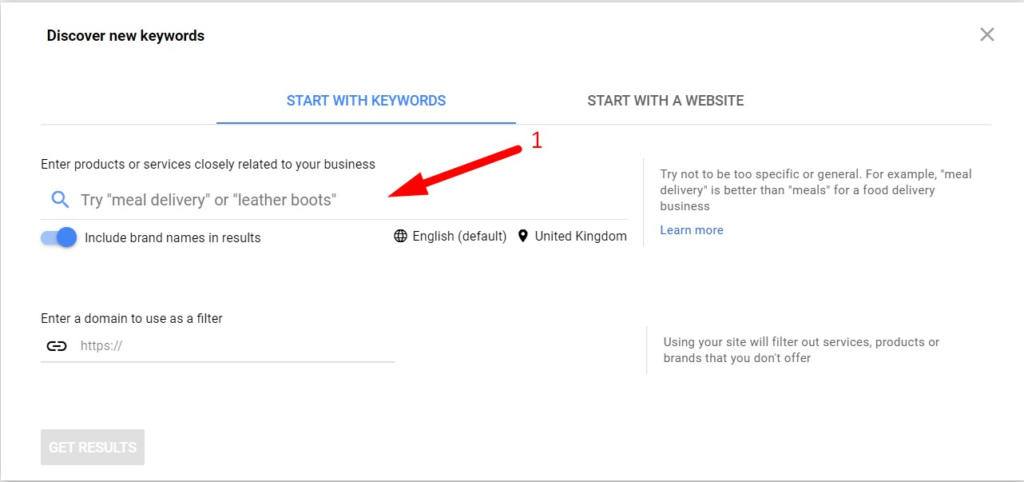
Then enter the main keyword in the field (1), for example, as shown below – “dog food”, and click (2) – Show Suggestions (Get Results).
The results in the Keyword Suggestions tab should be presented as follows:
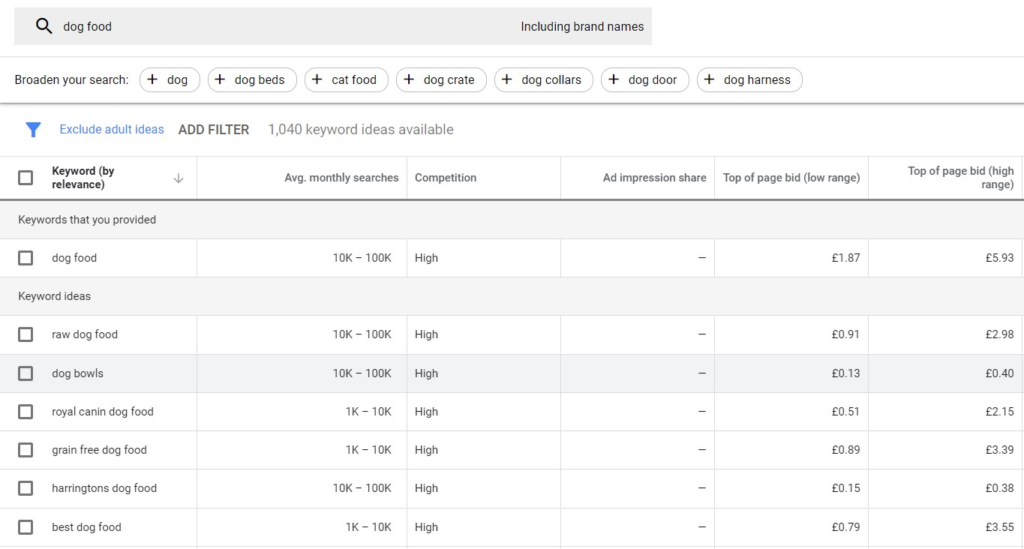
How to analyze keywords in terms of potential traffic?
With a complete list of keywords created by the methods described above, the only thing we have to do is to check how often a keyword is searched by Google search users. You can do it with the above-mentioned Google AdWords KeywordTool. But this time, go to the KeywordPlanner page, select the “Download keyword ideas” option, and paste the keywords, whose number in searches you want to check, into the field below.
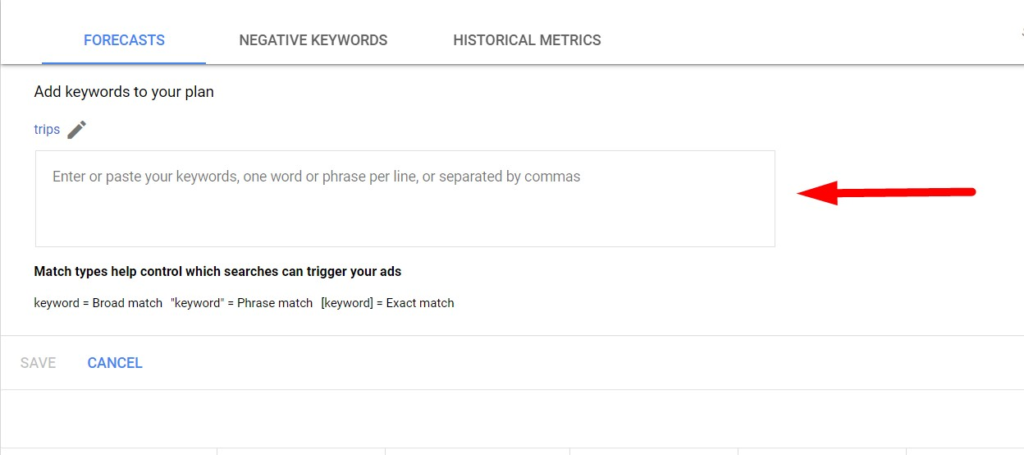
Then click “save”. Here’s an example of what search results will look like:
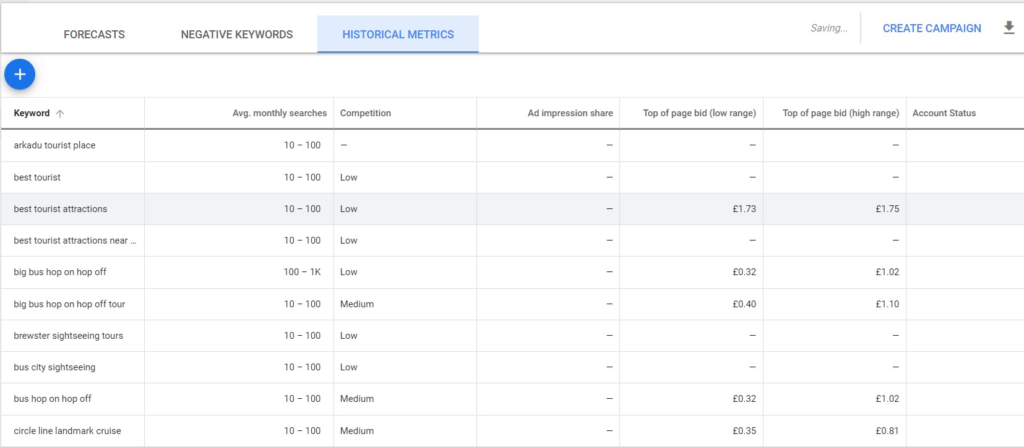
The column “Avg. monthly searches” contains information about how many times (on average) a keyword is typed by Internet users into the search engine. Additionally, hovering the cursor over the icon to the left of this number will give you a forecast for next year.

As shown in the example, some of the keywords are seasonal. This means that their popularity mostly depends on the month.
How to interpret information about the average search for this keyword? Based on the example, can we assume that being in the first position in the search results for the phrase “last minute tours”, the website will get the same number of views per month? Unfortunately not, the result cannot be accurately predicted.
Content Marketing Platform
- 100,000+ media publications;
- get backlinks to your product;
- scale work with content distribution.
What influences keyword competitiveness?
The last and very important factor in choosing keywords for positioning is their competitiveness. It is up to it the cost and duration of the website positioning for a particular keyword. Assessing the competitiveness of keywords requires special knowledge in SEO and some experience. Therefore, I will only list the factors that affect the competitiveness of keywords:
- area – The most competitive keywords are related to the most profitable business areas. The leading sectors are finance, banking, and insurance.
- a number of competitors – the more sites with similar topics and companies that carry out similar activities, the harder it is to achieve a better result than the results of your competitors.
- SEO-optimization of competitors’ websites – the more SEO-optimized websites are in the search results for the relevant keyword, the harder it will be to take the place for another new website.
- the number and quality of links that lead to competitors’ websites – the more quality links your competitors have, the harder it is to compete with them for high ranking in search results.

